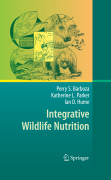
This book applies the basic principles of nutrition to the study of fish, reptiles, birds, and mammals in their natural environments. The acquisition of food, its digestion and absorption, and the retention and utilization of energy substrates, water and other nutrients are treated in detail. This integrated approach connects behavioral, morphological, and biochemical traits of animals to their life histories and their responses to variable and changing environments. The authors also provide a practical framework for understanding the interactions between food resources and wildlife populations, and for managing theharvest of abundant species and the conservation of threatened populations. Integrative Wildlife Nutrition provides a general reference work for students and professionals in animal physiology and ecology, conservation biology, and wildlife management. Lecturers can use this text for wildlife and conservation biology programs and as a reference source for related courses in animal ecology. Elucidates the importance of wildlife nutrition from molecules and cells to ecosystems Key concepts are illustrated with flow diagrams of biochemical pathways and with practical examples for monitoring the nutritional status of wild animals INDICE: Introduction: common themes across diverse taxa.- Food and populations.- Feeding dynamics: functional and behavioral responses.- Measuring food consumption.- Digestive function.- Carbohydrates: sugars, fiber and fermentation.- Lipids: fatty acids and adipose tissue.- Nitrogenous substrates: nucleic acids to amino excretion.- Metabolic constituents: water, minerals and vitamins.- Energy: carbon as a fuel and a tissue constituent.- Integrating nutrient supply and demand in variable environments.- References.- List of common and scientific names of animals and plants.- Index.
- ISBN: 978-3-540-87884-1
- Editorial: Springer
- Encuadernacion: Cartoné
- Páginas: 350
- Fecha Publicación: 01/01/2009
- Nº Volúmenes: 1
- Idioma: Inglés
